List of Parliamentary constituencies in North Yorkshire
The county of North Yorkshire, together with the unitary authority of York, is divided into 8 Parliamentary constituencies - one Borough constituency and 7 County constituencies.
Constituencies
† Conservative ‡ Labour ¤ Liberal Democrat
| Constituency[nb 1] | Electorate[1] | Majority[2][nb 2] | Member of Parliament[2] | Nearest opposition[2] | Map | ||
|---|---|---|---|---|---|---|---|
| Harrogate and Knaresborough CC | 77,941 | 9,675 | Andrew Jones† | Judith Rogerson¤ | 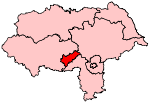 | ||
| Richmond (Yorks) CC | 82,569 | 27,210 | Rishi Sunak† | Thom Kirkwood‡ |  | ||
| Scarborough and Whitby CC | 74,404 | 10,270 | Robert Goodwill† | Hugo Fearnley‡ | 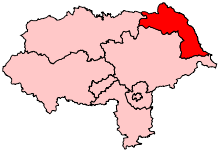 | ||
| Selby and Ainsty CC | 78,398 | 20,137 | Nigel Adams† | Malik Rofidi‡ |  | ||
| Skipton and Ripon CC | 78,673 | 23,694 | Julian Smith† | Brian McDaid‡ |  | ||
| Thirsk and Malton CC | 80,991 | 25,154 | Kevin Hollinrake† | David Yellen‡ | 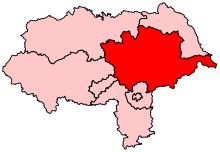 | ||
| York Central BC | 74,899 | 13,545 | Rachael Maskell‡ | Fabia Tate† |  | ||
| York Outer CC | 74,673 | 9,985 | Julian Sturdy† | Anna Perrett‡ |  | ||
Changes made in 2010
| Former name | Former boundaries |
|---|---|
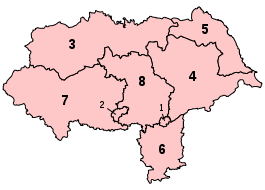 Parliamentary constituencies in North Yorkshire | |
The Boundary Commission for England recommended that the area continue to be divided into 8 constituencies, but extensively redrawn in the south-eastern part to accommodate exactly two seats in what is now York. These changes were implemented at the 2010 United Kingdom general election.
| Current name | Current boundaries |
|---|---|
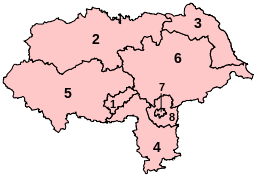 Proposed Revised constituencies in North Yorkshire | |
Proposed boundary changes
The Boundary Commission for England submitted their final proposals in respect of the Sixth Periodic Review of Westminster Constituencies (the 2018 review) in September 2018. Although the proposals were immediately laid before Parliament they were not brought forward by the Government for approval. Accordingly, they did not come into effect for the 2019 election which took place on 12 December 2019, and which was contested using the constituency boundaries in place since 2010.
Under the terms of the Parliamentary Voting System and Constituencies Act 2011, the Sixth Review was based on reducing the total number of MPs from 650 to 600 and a strict electoral parity requirement that the electorate of all constituencies should be within a range of 5% either side of the electoral quota.
On 24 March 2020, the Minister of State for the Cabinet Office, Chloe Smith, issued a written statement to Parliament setting out the Government's thinking with regard to parliamentary boundaries. They propose to bring forward primary legislation to remove the statutory obligation to implement the 2018 Boundary Review recommendations, as well as set the framework for future boundary reviews in time for the next review which is due to begin in early 2021 and report no later than October 2023. It is proposed that the number of constituencies now remains at the current level of 650, rather than being reduced to 600, while retaining the requirement that the electorate should be no more than +/- 5% from the electoral quota.[3]
Results history
Primary data source: House of Commons research briefing - General election results from 1918 to 2019[4]
2019
The number of votes cast for each political party who fielded candidates in constituencies comprising North Yorkshire in the 2019 general election were as follows:
| Party | Votes | % | Change from 2017 | Seats | Change from 2017 |
|---|---|---|---|---|---|
| Conservative | 239,887 | 54.4% | 7 | 0 | |
| Labour | 112,500 | 25.5% | 1 | 0 | |
| Liberal Democrats | 64,772 | 14.7% | 0 | 0 | |
| Greens | 11,441 | 2.6% | 0 | 0 | |
| Brexit | 1,479 | 0.3% | new | 0 | 0 |
| Others | 10,867 | 2.5% | 0 | 0 | |
| Total | 440,946 | 100.0 | 8 |
Percentage votes
| Election year | 1983 | 1987 | 1992 | 1997 | 2001 | 2005 | 2010 | 2015 | 2017 | 2019 |
|---|---|---|---|---|---|---|---|---|---|---|
| Conservative | 56.1 | 53.1 | 52.8 | 40.0 | 43.6 | 43.7 | 46.8 | 48.5 | 54.1 | 54.4 |
| Labour | 16.3 | 19.0 | 23.6 | 32.8 | 29.6 | 27.9 | 19.0 | 22.2 | 34.1 | 25.5 |
| Liberal Democrat1 | 27.4 | 27.5 | 22.9 | 23.0 | 23.5 | 24.7 | 27.8 | 9.2 | 7.3 | 14.7 |
| Green Party | - | * | * | * | * | * | 1.0 | 5.1 | 1.9 | 2.6 |
| UKIP | - | - | - | * | * | * | 2.7 | 13.2 | 1.1 | * |
| Brexit Party | - | - | - | - | - | - | - | - | - | 0.3 |
| Other | 0.2 | 0.4 | 0.7 | 4.2 | 3.4 | 3.7 | 2.7 | 1.9 | 1.5 | 2.5 |
11983 & 1987 - SDP-Liberal Alliance
* Included in Other
Seats
| Election year | 1983 | 1987 | 1992 | 1997 | 2001 | 2005 | 2010 | 2015 | 2017 | 2019 |
|---|---|---|---|---|---|---|---|---|---|---|
| Conservative | 7 | 7 | 6 | 4 | 4 | 5 | 7 | 7 | 7 | 7 |
| Labour | 0 | 0 | 1 | 3 | 3 | 2 | 1 | 1 | 1 | 1 |
| Liberal Democrat1 | 0 | 0 | 0 | 1 | 1 | 1 | 0 | 0 | 0 | 0 |
| Total | 7 | 7 | 7 | 8 | 8 | 8 | 8 | 8 | 8 | 8 |
11983 & 1987 - SDP-Liberal Alliance
Maps
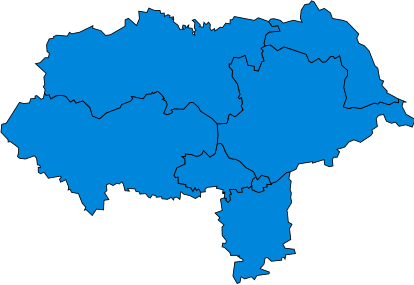 1983
1983 1987
1987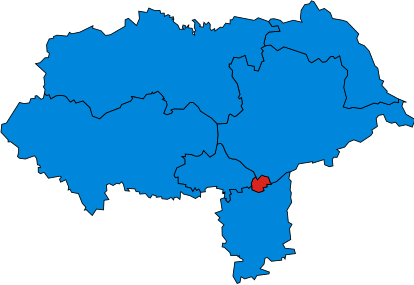 1992
1992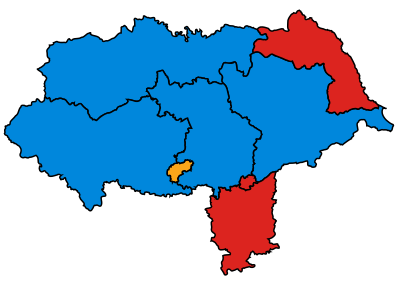 1997
1997 2001
2001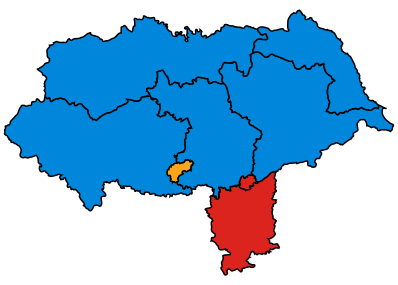 2005
2005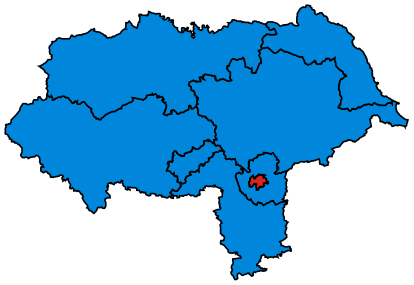 2010
2010 2015
2015 2017
2017 2019
2019
Historical representation by party
Data given here is for the North Riding of Yorkshire until 1983, and includes the city of York throughout. A cell marked → (with a different colour background to the preceding cell) indicates that the previous MP continued to sit under a new party name.
1885 to 1918
Conservative Independent Labour Liberal Liberal-Labour
| Constituency | 1885 | 1886 | 1892 | 93 | 1895 | 97 | 98 | 00 | 1900 | 02 | 05 | 1906 | Jan 1910 | Dec 1910 | 15 |
|---|---|---|---|---|---|---|---|---|---|---|---|---|---|---|---|
| York | A. Pease | Butcher | Greenwood | A. Rowntree | |||||||||||
| Lockwood | Beresford | Faber | Butcher | ||||||||||||
| Cleveland | H. Pease | A. Pease | Samuel | ||||||||||||
| Middlesbrough | I. Wilson | J. Wilson | → | Sadler | J. Wilson | Williams | |||||||||
| Richmond (Yorks) | Milbank | Elliot | Hutton | Dyke Acland | Orde-Powlett | ||||||||||
| Scarborough | Sitwell | J. Rowntree | Sitwell | Compton-Rickett | Rea | ||||||||||
| Thirsk and Malton | Dawnay | Lawson | Duncombe | Turton | |||||||||||
| Whitby | E. Beckett | Buxton | G. Beckett | ||||||||||||
1918 to 1950
Conservative Independent Labour Liberal
| Constituency | 1918 | 1922 | 1923 | 1924 | 28 | 1929 | 31 | 1931 | 1935 | 37 | 40 | 41 | 45 | 1945 | 48 | 49 |
|---|---|---|---|---|---|---|---|---|---|---|---|---|---|---|---|---|
| York | Butcher | Marriott | Burgess | Lumley | Wood | Corlett | ||||||||||
| Cleveland | Goff | Starmer | Goff | Mansfield | Bower | Willey | ||||||||||
| Middlesbrough East | Williams | Brown | Williams | Wilkinson | Young | Edwards | → | → | ||||||||
| Middlesbrough West | Thomson | Griffith | Johnstone | Bennett | Cooper | |||||||||||
| Richmond (Yorks) | Wilson | Dugdale | ||||||||||||||
| Scarborough and Whitby | Beckett | Herbert | Latham | Spearman | ||||||||||||
| Thirsk and Malton | E. Turton | R. Turton | ||||||||||||||
1950 to 1983
Conservative Labour Social Democratic
| Constituency | 1950 | 1951 | 52 | 1955 | 1959 | 62 | 1964 | 1966 | 1970 | Feb 1974 | Oct 1974 | 1979 | 81 |
|---|---|---|---|---|---|---|---|---|---|---|---|---|---|
| York | Hylton-Foster | Longbottom | Lyon | ||||||||||
| Cleveland / Cleveland and Whitby (1974) | Willey | Palmer | Proudfoot | Tinn | Brittan | ||||||||
| Middlesbrough East / Middlesbrough (1974) | Marquand | Bottomley | |||||||||||
| Middlesbrough West / Thornaby (1974) | Cooper | Simon | Bray | Sutcliffe | Wrigglesworth | → | |||||||
| Richmond (Yorks) | Dugdale | Kitson | |||||||||||
| Scarborough and Whitby / Scarborough (1974) | Spearman | Shaw | |||||||||||
| Thirsk and Malton | Turton | Spence | |||||||||||
| Redcar | Tinn | ||||||||||||
1983 to present
Conservative Labour Liberal Liberal Democrats
| Constituency | 1983 | 86 | 1987 | 89 | 1992 | 1997 | 2001 | 2005 | 2010 | 2015 | 2017 | 2019 |
|---|---|---|---|---|---|---|---|---|---|---|---|---|
| York / York Central (2010) | Gregory | Bayley | Maskell | |||||||||
| Harrogate / Harrogate and Knaresborough (1997) | Banks | Willis | Jones | |||||||||
| Richmond (Yorks) | Brittan | Hague | Sunak | |||||||||
| Ryedale / Thirsk and Malton (2010) | Spence | Shields | Greenway | McIntosh | Hollinrake | |||||||
| Scarborough / Scarborough and Whitby (1997) | Shaw | Sykes | Quinn | Goodwill | ||||||||
| Selby / Selby and Ainsty (2010) | Alison | Grogan | Adams | |||||||||
| Skipton and Ripon | Watson | Curry | Smith | |||||||||
| Vale of York / York Outer (2010) | McIntosh | Sturdy | ||||||||||
See also
- List of Parliamentary constituencies in Yorkshire and the Humber (region)
- List of Parliamentary constituencies in Cleveland for those covering Middlesbrough, Redcar and Cleveland and Stockton-on-Tees in the ceremonial county of North Yorkshire.
Notes
- BC denotes borough constituency, CC denotes county constituency.
- The majority is the number of votes the winning candidate receives more than their nearest rival.
References
- Baker, Carl; Uberoi, Elise; Cracknell, Richard (28 January 2020). "General Election 2019: full results and analysis". Commons Library.
- "Constituencies A-Z - Election 2019". BBC News. Retrieved 28 April 2020.
- "Update: Strengthening Democracy:Written statement - HCWS183". UK Parliament. Retrieved 20 April 2020.
- Watson, Christopher; Uberoi, Elise; Loft, Philip (17 April 2020). "General election results from 1918 to 2019".